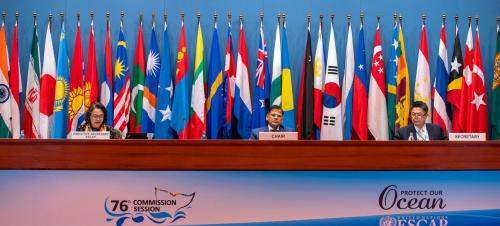Asia-Pacific nations commit the whole region to ‘defeat’ COVID-19
Gathering together at the top UN intergovernmental body in Asia and the Pacific on Thursday, countries of the vast region of more than four billion people, urged greater measures that reinforce global solidarity in ending the COVID-19 pandemic.

Executive Secretary Armida Alisjahbana (left) with other participants at the 76th session of the Economic and Social Commission for Asia and the Pacific (ESCAP) in Bangkok.
In a resolution adopted on Thursday, the UN Economic and Social Commission for Asia and the Pacific (ESCAP) declared “profound solidarity” with the countries and people affected by the disease and resolved “to pursue coordinated and decisive actions, to contain, mitigate and defeat the pandemic through reinforced regional and global cooperation.”
“[The Commission] reiterates the importance of multilateralism and international cooperation, and encourages action by all members … to promote measures that may reinforce global solidarity in responding to the outbreak of COVID-19”, read the resolution, which was tabled by the Chair and co-sponsored by several of the Commission member States.
International and regional cooperation was also highlighted as a means to strengthen the resilience of the region’s countries, with regard to the socioeconomic effects of pandemics and other related crises.
Recovering from COVID-19 provides an opportunity to “build back better” in the region, added the text, “including by building more equal, inclusive and sustainable institutions, economies and societies that respect human rights and are more resilient in the face of any future pandemic, and other related crises faced by the region, in line with the 2030 Agenda for Sustainable Development.”
‘Build back better’
The importance of the 2030 Agenda to realize a better future was also underscored by the UN Secretary-General at the opening of the Commission’s seventy-sixth session.
“I am strongly convinced that we have an opportunity to build back better on the foundations of the 2030 Agenda for Sustainable Development” said Secretary-General António Guterres in a video message.
“That means forging common solutions to the climate crisis, economic and social inequalities, new forms of violence, and rapid changes in technology and demography. We can rescue our planet and build a better world for all. Let us work together to do just that.”
The hope of a better future was echoed by leaders from across the Asia-Pacific region.
Prayut Chan-o-cha, the Prime Minister of Thailand; Sheikh Hasina, the Prime Minister of Bangladesh; Josaia Voreqe Bainimarama, the Prime Minister of Fiji; and Kausea Natano, the Prime Minister of Tuvalu delivered video messages from their capitals.
In their messages the leaders cautioned about the complexities and growing threats of COVID-19 on sustainable development. They, however, also expressed their optimism that recovery will provide the opportunity to strengthen resilience and build a more equal, inclusive and sustainable Asia-Pacific region.
Balancing pandemic response with socio-economic recovery
As a result of the pandemic, countries have witnessed dramatic falls in economic growth and jobs, only to be followed by low demand, constrained trade and reduced mobility.
Against this background, Armida Salsiah Alisjahbana, the Executive Secretary of ESCAP, highlighted three key areas to help balance pandemic containment measures against those for socio-economic recovery: protecting and investing in people and enhancing resilience; supporting sustainable and inclusive economic recovery; and restoring supply chains and supporting small and medium enterprises.
“These challenging times calls upon us, as citizens of the region, to extend our hands to the most vulnerable. Upholding our collective strengths, rekindling our values and reinvigorating the spirit of compassion unite us as we chart new pathways,” she said.
First-ever virtual session
In its more than seven decade history, this was the first time the Commission’s membership convened virtually, via video-conference, with only the ESCAP’s incoming Chair, Md. Nazmul Quaunine, the Ambassador and Permanent Representative of Bangladesh; the Executive Secretary of ESCAP; and a handful of secretariat officials in the body’s primary chamber - “ESCAP Hall” - at the UN Conference Centre in Bangkok.
The outgoing Chair, Damdin Tsogtbaatar the Minister of Foreign Affairs of Mongolia, opened the session remotely from Ulaanbaatar, and all participants, numbering about 260 from 54 of the Commission’s 62 members and associate members, connected remotely.
For its annual session, the Commission usually meets over five days, hosting several special and side events as well as exhibitions, drawing over a thousand participants, including civil society organizations representatives and university students.
Established in 1947, ESCAP is the largest of the UN’s five regional commissions – both in terms of geographic coverage and population served – its membership spanning from the Pacific island nation of Kiribati in the east, to Turkey in the west, and Russia in the north, to New Zealand in the south.
Source:UN
- 267 reads
Human Rights
Ringing FOWPAL’s Peace Bell for the World:Nobel Peace Prize Laureates’ Visions and Actions

Protecting the World’s Cultural Diversity for a Sustainable Future

The Peace Bell Resonates at the 27th Eurasian Economic Summit

Declaration of World Day of the Power of Hope Endorsed by People in 158 Nations

Puppet Show I International Friendship Day 2020

